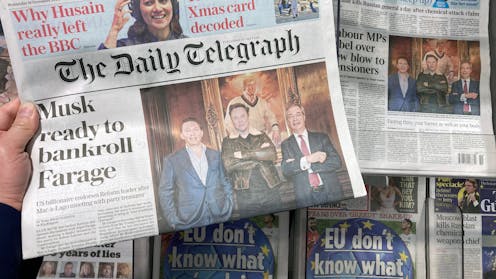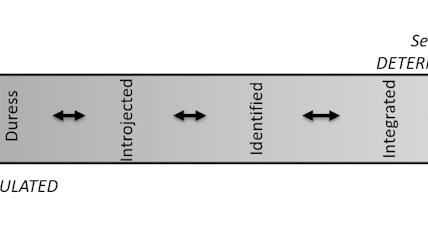Why it matters who owns a newspaper
Steve Travelguide/Shutterstock
The House of Lords this week approved government legislation that will allow foreign states to hold up to a 15% stake in British newspaper publishers.
This vote clears the way for the American investment company Redbird to take control of the troubled Telegraph newspaper group following two years of uncertainty. An integral element of that bid is a 15% stake by the sovereign investment fund IMI which is owned by Sheikh Mansour bin Zayed Al Nahyan, the vice-president of the United Arab Emirates.
The heated Lords debate raised fundamental questions about who should own newspapers, and the link between ownership and editorial content. On one side were those who argued that Britain’s newspapers faced an “existential threat” without outside investment. On the other were those who warned against the potential influence of a foreign power on one of the UK’s longest standing publishers.
Media mergers and acquisitions are often contentious. But given the parlous state of the newspaper industry, they are likely to become more frequent.
A very different kind of newspaper deal was completed last December, when news website Tortoise Media bought The Observer. Tortoise, which was founded in 2018 by former Times editor and BBC director of news James Harding, startled analysts and journalists alike by taking over a newspaper first published in 1791.
The deal prompted strong opposition from some Observer and Guardian journalists. But from a business perspective, the deal suited both sides.
The Scott Trust, owners of the Observer since 1993, never seemed wholly committed to the Observer. (There was, for example, no dedicated Observer website). Tortoise, meanwhile, was keen to exploit the brand values of an established print product. It saw the Observer as a suitable vehicle for its approach of news analysis and explanation rather than breaking stories.
The media world has also been fixated on the succession story of the Murdoch family and its implications for his UK newspapers. The Sun, News of the World (until its closure in 2011), the Times and Sunday Times have been the bedrock of Rupert Murdoch’s economic and political power in the UK for decades.
In December, he lost the battle to give his eldest son Lachlan exclusive control of his media empire.
Speculation has grown as to whether any of Rupert’s progeny will want to continue the family’s print tradition after his death. His empire has suffered repeated financial and reputational hits since the phone hacking scandal. It is perfectly feasible that, once he goes, all the Murdoch press interests will be up for sale.
These various battles beg the question: why does it matter who owns a newspaper? In short, it matters because ownership, to a large extent, determines content.
Who owns the news?
From the very beginning of printed news, proprietors have exercised control over their title’s political direction and journalistic values. Prewar Britain saw Lord Beaverbrook famously exploiting his Express newspapers to campaign for free trade within the British empire.
Meanwhile, fellow newspaper baron Lord Rothermere turned his Mail newspapers into propaganda sheets for Oswald Mosley’s blackshirts, and cheerleaders for Adolf Hitler and Benito Mussolini during the 1930s.
The Rothermere family’s continued ownership of the Mail has guaranteed a consistent anti-immigration, anti-Europe rightwing worldview to the present day. How this consistent framing has been transmitted through the Mail’s editors has been well documented by journalist Adrian Addison.
Murdoch’s UK newspaper empire has also pursued his personal free market, anti-EU political vision. He has used his papers to attack the publicly funded BBC and the regulator Ofcom. Murdoch has, however, been slightly more flexible in adjusting his papers’ party political allegiance (guaranteeing a succession of prime ministerial genuflections from Margaret Thatcher through to Keir Starmer).
At the other end of the political spectrum, the Scott Trust – owners of the Guardian – was conceived by the son of C.P. Scott as a vehicle for sustaining his father’s liberal mission for the paper. It has a policy of no editorial interference, apart from continuing the paper’s editorial policy on “the same lines and in the same spirit as heretofore”. Editors are therefore enjoined to focus on the kind of progressive news agenda championed by Scott.
The trust model allows a level of freedom from traditional commercial oversight. Editors can pursue the Guardian’s well-established liberal tradition without worrying about shareholders driven by short-term profit maximisation, or an individual owner with a specific ideological agenda. This partly explains the hostility of Observer journalists to the Tortoise takeover.
Why it matters
The Lords debate focused on the risks of foreign state investment in British newspapers. But all commercial ownership models – and all owners – have their problems. Whether it be greedy shareholders, a power-hungry narcissist, an ideologically-driven family or a foreign state seeking influence in the UK, commercial models all involve editorial compromises.
One approach to the problems raised by commercial ownership is an insistence, through legislation, on a plurality of owners. But this is increasingly difficult in an industry whose traditional advertising-funded business model is under severe pressure. This context is precisely why the Telegraph’s new owner was desperate to access IMI funds.
Upmarket publications such as the Financial Times and the Times can monetise subscriptions, but paywalls discourage easy access and diminish journalistic reach. Subscriptions are also a much less attractive proposition for tabloids whose readers are less willing to pay.
Another approach is to diversify ownership models. Non-profit and charitable publishers, such as OpenDemocracy or the Bureau of Investigative Journalism, can leverage donations and are less vulnerable to the whims of corporate owners or powerful individuals. But this model is much less developed in the UK than the US.
I and colleagues have argued elsewhere that there are strong arguments for making charitable journalism easier. These models can enhance journalistic freedom, but they also come with potential downsides that need to be acknowledged.
All these options presuppose, of course, that newspapers and their online sites still have sufficient relevance and reach for us to continue to worry about ownership at all – a topic for another article.
Get your news from actual experts, straight to your inbox. Sign up to our daily newsletter to receive all The Conversation UK’s latest coverage of news and research, from politics and business to the arts and sciences.
Steven Barnett is on the management and editorial boards of the British Journalism Review. He is a member of the British Broadcasting Challenge which campaigns for Public Service Broadcasting. He is on the Advisory Board of the Charitable Journalism Project which campaigns for public interest journalism and on the board of Hacked Off which campaigns for a free and accountable press.



